Ez – Statutes, Mitzvot, and Ordinances 26: 16-19
Statutes, Mitzvot, and Ordinances
26: 16-19
Statutes, mitzvot, and ordinances DIG: What is the significance of the “heart” and the “soul” when it comes to obedience? In the mutual declarations, which comes first? God’s? Or the people’s? Why is one based on the other? What is different about this confession, and the first two we have seen?
REFLECT: What is the significance of, “This day,” “Today,” and “Now today,” for you? What sense of urgency do you have about God’s Word? Do you have God’s Word in your heart? Do you know that God has great things planned for you, and that your salvation is secure?
God guaranteed the blessings of His covenant to Isra’el; the blessing was promised to the nation as a whole, even though certain people may suffer on particular occasions.
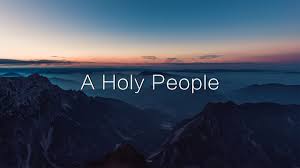
These four verses conclude Moses’ explanation of the stipulation of the Covenant (to see link click Bi – The Stipulations of the Covenant) by calling for a total commitment to the LORD and His mitzvot, and also by affirming God’s commitment to Isra’el. This section may also be viewed as a formal ratification of the covenant between ADONAI and Isra’el even though the word “covenant” does not appear in these four verses (see Ah – The Treaty of the Great King). Isra’el accepted and affirmed her covenantal responsibilities and YHVH affirmed His promise to exalt an obedient Isra’el over all the nations of the earth.
The first two confessions (see Ex – When You Come into the Land) and (Ey – The Year of the Tithe), looked forward to the time when Isra’el would be settled in their Land and reaping the harvests. This confession, however, brings us back to the plains of Mo’ab where Moshe was equipping the younger generation to enter the Land of Promise.
A. This day: Every member of God’s covenantal nation needed to live wholeheartedly in accordance with His mitzvot. This day ADONAI your God is commanding you to do these statutes and ordinances – so you are to take care and do them with all your heart and with all your soul (26:16). This day, and today, were the words Moses used frequently as he addressed the people (2:25, 4:26 and 29, 6:6, 7:11, 8:1 and 18, 10:13, etc). It was indeed a solemn time when Moshe reiterated the mitzvot and reviewed the nation’s history. The future generation depended on the people receiving, understanding, and obeying the Word of God that Moses was sharing with them.
B. Today: By embracing their covenantal relationship with YHVH, the Israelites affirmed that Ha’Shem was their God, and that they were His people. Their promises to walk, keep and obey, would be the means by which they would demonstrate their identity as the people of God to the surrounding nations.568 Today you have affirmed ADONAI as your God, that you will walk in His ways, keep His statutes, mitzvot and ordinances, and listen to His voice (26:17). God’s statues (Hebrew: hachukkim, meaning to write into law permanently), mitzvot, and ordinances (Hebrew: hammishpatim, meaning a judgment of the court) needed to be observed for the nation to prosper. This triad: mitzvot, statues, and ordinances appear in three other passages (5:31, 6:1, and 7:11), and embody everything that God commanded as a unit. The constant danger was that the people not receive God’s Word into their hearts, but only hear it with their ears . . . and then forget it. Like the Israelites of Yeshua’s day, they had ears but could not hear.
Messiah said: This is why I speak to them in parables: Though seeing, they do not see; though hearing, they do not hear or understand. Otherwise, they might turn and be forgiven (Matthew 13:13; Mark 4:12). Jesus’ audiences were not denied the opportunity to believe in Him. But after persistently closing their minds to His message, they were excluded from further understanding it by His use of parables. Yet even the parables, which veiled the truth, were meant to provoke thought, enlighten and potentially reveal it. The parables uniquely preserved people’s freedom to believe, while demonstrating that if such a decision is made, it is the gift of God (Ephesians 2:8-9).569 But because the people looked to the Sanhedrin to make a decision about the validity of Christ’s messiahship and the Jewish Supreme Court having rejected Him, the majority of the people started to turn against the Son of God.
Isaiah perfectly described the faithless Jews of Yeshua’s day. The parables fulfilled the prophecy of Isaiah: You will be ever hearing but never understanding; you will be ever seeing but never perceiving. For this people’s heart has become calloused; they hardly hear with their ears, and they have closed their eyes. Otherwise, they might see with their eyes, hear with their ears, understand with their hearts and turn, and I would heal them (Mattityahu 13:14-15). Isaiah wrote during a time of devastating judgment against the southern kingdom of Judah. While Isaiah was preaching his message of doom, King Uzziah died and the nation was plunged into some of the darkest days it had ever seen (see my commentary on Isaiah Bo – In the Year King Uzziah Died).
A mere casual acquaintance with the Word isn’t sufficient. If God’s Word is to nurture us and change us so that God can bless us (Psalm 1:1-3), we must devote our lives to it, heart and soul. God had claimed Isra’el for His own people and promised to bless them if they obeyed Him (16:18), and Isra’el had declared that YHVH was their God and that they would obey Him, “Today you have affirmed ADONAI as your God, that you will walk in His ways, keep His statutes, mitzvot and ordinances, and listen to His voice” (26:17). There was no doubt that ADONAI would keep His promises . . . would Isra’el keep theirs?
A. Now today: In accordance with His earlier declaration (7:6), the LORD affirms that Isra’el is His specially chosen nation and that He will one day set them in a grand position over all the nations of the world.570 Now today ADONAI has affirmed you as His treasured people, as He promised you; that you are to keep all His mitzvot; that He will set you high above all the nations He has made, for praise, fame and honor; and that you are to be a holy people to ADONAI your God, as He has promised (26:18-19).
God had great things planned for Isra’el, just as He has great things planned for each of His children (Ephesians 2:10; First Corinthians 2:6-10). If the people kept their covenant promises to the LORD, He would bless them and make them a blessing, but if they disobeyed Him, He would have to discipline them. But My people would not listen to Me; Isra’el would not submit to Me. So, I gave them over to their stubborn hearts to follow their own devices. If My people would follow My ways, how quickly would I subdue their enemies and turn My hand against their foes . . . He would have fed them with the finest of wheat; with honey from the rock I would satisfy them (Psalm 81:11-14 and 16 NIV).
Yes, our salvation is secure (see the commentary on The Life of Christ Ms – The Eternal Security of the Believer), but if we disobey His Word, we not only miss out on the many blessings in this life, but also crowns in the next life (see the commentary on Revelation Cc – For We Must All Appear Before the Judgment Seat of Christ).
Dear Heavenly Father, You are so wonderful! You plan the lives of Your children so they will have the greatest joy for all eternity, but just as it was important for Isra’el to keep the covenant promises to receive blessings, so it is important for those who follow You now to keep the covenant promises. A mere casual acquaintance knowledge of You and Your Word isn’t sufficient. Your Word says: They replied, “Believe in the Lord Jesus, and you will be saved – you and your household” (Acts 16:31 NIV). Real believing is not a mere head nod of approval, but it is a heart love that bows the knee to you by making you their Lord. For if you confess with your mouth that Yeshua is Lord, and believe in your heart that God raised Him from the dead, you will be saved. For with the heart it is believed for righteousness, and with the mouth it is confessed for salvation. For the Scripture says, “Whoever trusts in Him will not be put to shame.” For there is no distinction between Jew and Greek, for the same Lord is Lord of all – richly generous to all who call on Him (Romans 10:9-12). Praise You that those who choose to love and worship You as their Lord and Savior, You call your own children. But whoever did receive Him, those trusting in His name, to these He gave the right to become children of God (John 1:12). You are so indescribably awesome in love, in holiness, in patience, in mercy, in grace and in everything that is good. Words are not superlative enough to express how worthy You are of all our love and obedience! I love You and want to honor You in all I do, think and feel. In Yeshua’s holy name and power of His resurrection. Amen















 Y el mar entregó a los muertos que había en él, y la Muerte y el Hades (o Seol) entregaron los muertos que había en ellos, y fueron juzgados, cada uno según sus obras (20:13). En la Biblia, el mar es una metáfora bíblica de muerte, destrucción y agitación. Isaías nos dice que los impíos son como el mar tempestuoso, que no puede aquietarse: Sus aguas remueven el cieno y el lodo (Isaías 57:20; también vea Ezequiel 28:8 y Salmo 107:25-28), que liberará sus muertos para juicio. Anteriormente vimos que solo Yeshua tiene la autoridad, o las llaves, sobre la muerte y el Hades (o Seol) (1:18). La muerte y el Hades también habían aparecido juntos montando un caballo pálido (6:8). Como compañeros inseparables, “Seol” fue el sepulturero, enterrando los restos de las víctimas de la muerte durante la Gran Tribulación. Visto aquí, liberarán a los muertos para el juicio final en el cielo ante el Señor.
Y el mar entregó a los muertos que había en él, y la Muerte y el Hades (o Seol) entregaron los muertos que había en ellos, y fueron juzgados, cada uno según sus obras (20:13). En la Biblia, el mar es una metáfora bíblica de muerte, destrucción y agitación. Isaías nos dice que los impíos son como el mar tempestuoso, que no puede aquietarse: Sus aguas remueven el cieno y el lodo (Isaías 57:20; también vea Ezequiel 28:8 y Salmo 107:25-28), que liberará sus muertos para juicio. Anteriormente vimos que solo Yeshua tiene la autoridad, o las llaves, sobre la muerte y el Hades (o Seol) (1:18). La muerte y el Hades también habían aparecido juntos montando un caballo pálido (6:8). Como compañeros inseparables, “Seol” fue el sepulturero, enterrando los restos de las víctimas de la muerte durante la Gran Tribulación. Visto aquí, liberarán a los muertos para el juicio final en el cielo ante el Señor. Y el diablo que los engañaba fue arrojado al lago de fuego y azufre, donde también están la bestia y el falso profeta, y serán atormentados día y noche por los siglos de los siglos (20:10) (vea el comentario sobre
Y el diablo que los engañaba fue arrojado al lago de fuego y azufre, donde también están la bestia y el falso profeta, y serán atormentados día y noche por los siglos de los siglos (20:10) (vea el comentario sobre 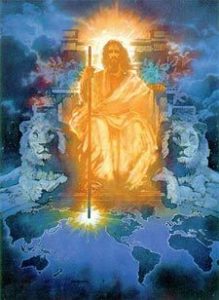 Todos los humanos serán juzgados (Mateo 25:32; Segunda Corintios 5:10; Hebreos 9:27). Pablo (rabino Saulo) advierte que todos compareceremos ante el tribunal de Dios (
Todos los humanos serán juzgados (Mateo 25:32; Segunda Corintios 5:10; Hebreos 9:27). Pablo (rabino Saulo) advierte que todos compareceremos ante el tribunal de Dios (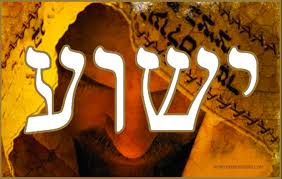
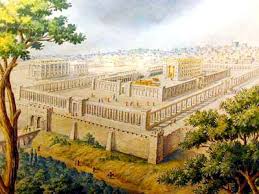 (4) El Templo del Milenio.
(4) El Templo del Milenio.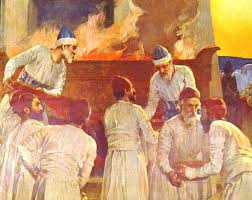 (5) El Sacerdocio Mesiánico y el sistema de sacrificio.
(5) El Sacerdocio Mesiánico y el sistema de sacrificio. (6) El río Milenial.
(6) El río Milenial.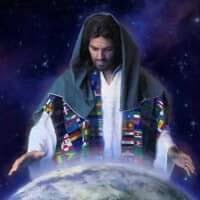 Jesús el Mesías gobernará como Rey.
Jesús el Mesías gobernará como Rey.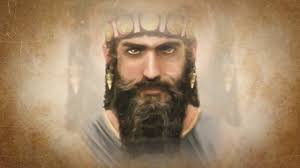 Durante el reino mesiánico, las diferentes naciones gentiles tendrán reyes sobre ellas. Que se postren ante él todos los reyes, Y todas las naciones le sirvan (Salmo 72:11). Estos reyes tendrán sus cuerpos naturales, mientras que los creyentes que los gobiernen tendrán sus cuerpos resucitados. Mientras que los reyes tendrán dominio sobre las diversas naciones, ellos mismos estarán bajo la autoridad de la Iglesia y los mártires de la Tribulación. En consecuencia, en la rama de gobierno gentil, la cadena de mando será de Cristo a los santos de la Iglesia y la Tribulación, a los reyes de las naciones gentiles, y finalmente, a las naciones gentiles mismas.
Durante el reino mesiánico, las diferentes naciones gentiles tendrán reyes sobre ellas. Que se postren ante él todos los reyes, Y todas las naciones le sirvan (Salmo 72:11). Estos reyes tendrán sus cuerpos naturales, mientras que los creyentes que los gobiernen tendrán sus cuerpos resucitados. Mientras que los reyes tendrán dominio sobre las diversas naciones, ellos mismos estarán bajo la autoridad de la Iglesia y los mártires de la Tribulación. En consecuencia, en la rama de gobierno gentil, la cadena de mando será de Cristo a los santos de la Iglesia y la Tribulación, a los reyes de las naciones gentiles, y finalmente, a las naciones gentiles mismas.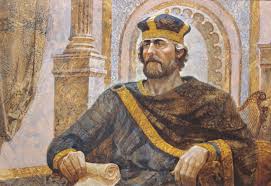 Habrá una rama judía de gobierno.
Habrá una rama judía de gobierno.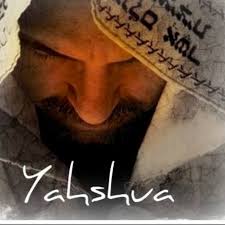 La
La